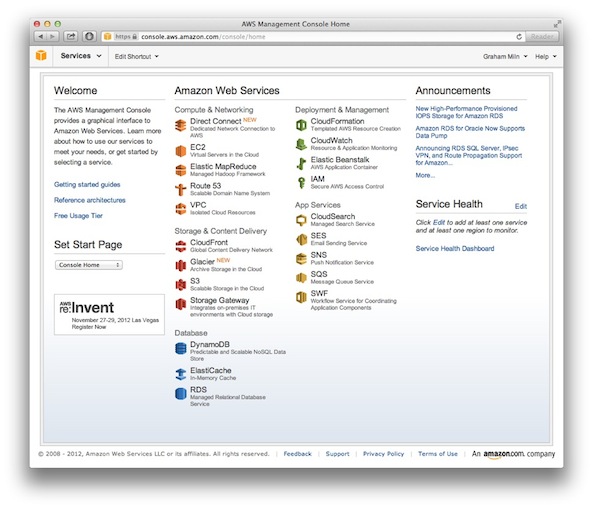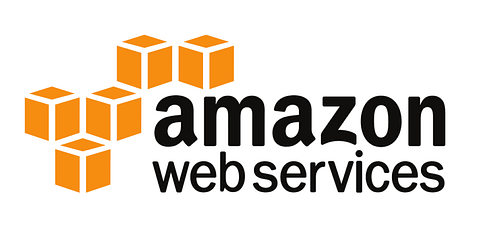If you are planning to host your web application on AWS Elasticbeanstalk service, then you must install the EB CLI available for remotely connecting to the Elasticbeanstalk environment and perform different operations on it.
There are two ways to install the AWS EB CLI on your mac OS machine:
- The AMIs (Amazon Machine Images) for EC2 Mac instances are EC2-optimized and include following packages: An ENA driver, the AWS Command Line Interface (CLI), the CloudWatch Agent, CloudFormation.
- Here are the two steps to install AWS cli on mac OSX. FIRST Offical version. Brew install awscli. SECOND Development version. Brew install awscli -HEAD.
Using Homebrew
Using Python and Pip
We will cover both the ways, with a complete step by step guide. So you just sit back, put your brain aside and just blindly follow these steps.
AWS CLI v1.15.32 or higher; Kubectl; aws-iam-authenticator; The instructions below are to install the tools on a Mac OS client. AWS CLI – The easiest way to install the AWS CLI on a mac is to use homebrew. If you’ve already got homebrew installed on your Mac, then skip over this. Otherwise run the following from a terminal in order to. Building and testing iOS and iPadOS apps with AWS DevOps and, In this module, you will add an API to our app using the Amplify CLI and libraries. The API you will be creating is a GraphQL API that leverages AWS AppSync (a To develop iOS apps, you need a Mac computer running the latest version of Xcode.
Using Homebrew:
Homebrew is a package manager for macOS. It doesn't come pre-installed, so you will have to install Homebrew on your macOS first, before using it to download EB CLI.
Once you have successfully installed Homebrew, you can run the following command to install EB CLI:
Running the above command will install the latest version of the AWS elasticbeanstack command line interface.
Using Python and Pip:
If you have python and pip package manager installed in your macOS then we can use pip to install AWS elasticbeanstack command line interface.
Run the following command to install AWS EB CLI using pip:
The --upgrade option is to inform the pip package manager to upgrade all the requirements for awsebcli, that are already installed. The --user option is to install awsebcli in a subdirectory of your user directory, so that our installation doesn't affect any libraries used by the operating system.
Note: We can also install the awsebcli tool in a virtual environment. You can install Python and setup virtual env on macOS very easily using the venv module.
Once the pip command successfully installs the awsebcli tool, if you will try to run the eb --version command to check the version of the installed tool, or you will run the eb command, you will get -bash: eb: command not found error. But we just installed it using pip, right?
Well to start using the eb command, we will have to add the executable file to our PATH variable.
Add the executable file to PATH variable:
In macOS, we can find the Python installation here: ~/Library/Python/3.7/bin (change the version of Python as per your installation and verify that it is there once)
Adding executable file to PATH variable is three-step process:
Find the shell's profile, as there are multiple supported shells.
Add export command to our profile script
Load the profile script.
Let's see how we can complete the above-mentioend points.
1. Find the shell profile:
To find your machine's supported shell profile, run the following command in the terminal:
/bin/bash
You can also run the below command to see the bash profile files.

.bash_history
.bash_profile
.bash_sessions
Desktop
Documents
As you can see in the output above, we have .bash_profile available, so we will update this profile to start working with the AWS eb command.
2. Add export command to our profile script:
In this step we will be adding an export command to our profile script. The following example adds the path represented by LOCAL_PATH to the current PATH variable.
Aws Cli 2 Download
If you have Python 3.6 installed, then you should run the below command:
3. Load the profile script:
Now we will load the profile script in which we added the export PATH in the second step into our current session. The command below will load the profile script, we just updated:
And that's it. We are done!
Now to test, that everything was completed successfully, run the following command:
Mac Install Aws Cli
And you should see the version of the EB CLI that you installed.
Note: Every time you want to use the EB CLI, you may have to run step 2 and step 3 again to load the bash profile with the changes. So keep them saved somewhere or bookmark this URL.
Now that you have the Elasticbeanstalk CLI setup, you can start with provisioning a new environment for yourself.
Best FTP client for Mac
Amazon Simple Storage Service or Amazon S3 makes it easy to store and manage large amounts of data. Enabling tons of operations, from storing and extraction to backup, it’s an easy way to scale and manage anyone’s resources – both on individual and organizational levels.
On Amazon S3, data is stored in buckets, which look like folders that store objects (files) in a folder structure. Similarly to how you structure data on your computer, you can use third-party S3 tools to structure, visualize, and navigate data in buckets. It’s also easy to interact with Amazon S3 buckets through the web console and AWS CLI (Command Line Interface).
To make your workflow smoother, you can additionally employ tools like ForkLift, an Amazon S3 client for macOS. This handy file management app makes connecting, uploading, downloading, and syncing of Amazon S3 buckets more organized and easier.
Connect to AWS bucket
Aws Cli Install Mac Os
There are three ways to access AWS buckets via ForkLift’s connect panel:
- Press Command-K;
- Select Go Connect from the menu;
- Click the Connect button with a lightning symbol in the toolbar
Once you access the connect panel, fill in the fields:
- From the dropdown menu, select Amazon S3 in Protocol.
- Amazon AWS Server is preset for Amazon S3, so you can leave the Server field empty. It’s also possible to connect to other S3 compatible storage providers by entering the right server address.
- Type in the Access Key and Secret Pass, which are provided to you by Amazon.
- If needed, customize further parametres or change encryption type and permissions.
- Press the Connect button.
Once the connection is established, you gain access to your account’s file structure. It looks just the same as the file structure of your Mac, so you won’t have any troubles getting used to the workflow. Create and delete buckets or move files and folders around. External file transferring is also super easy – the app allows you to move files across buckets, Macs, or other accounts.

Try an Amazon S3 client
Setapp enhances Amazon S3 syncing on your Mac with one powerful app that covers it all.
Sync Amazon S3 to a local Mac hard drive
The dual pane outlay of ForkLift makes synchronizing data super convenient, because this way you can see the source and the target folder side by side. To sync, open your source folder in one pane and your target folder in another. After you’ve selected the folders you want to sync, press Command-Option-Shift-S, select Commands Sync to from the menu, or click the Sync button (two circular arrows) in the toolbar to open the Sync panel.
In the Sync panel, you can see two panes which show the content of the folders you’ve previously selected. Next to the panes you can see the settings which you can change to suit your needs. First, you should determine the direction of the synchronization. You can choose between three directions to synchronize items:
- from left to right;
- from right to left;
- both ways.
To ensure you are syncing into the right direction, always double check the name and the path of each folder at the top of the panes and take a look at the arrows between the two panes.
You can further fine-tune your synchronization by determining if you want to:
- add items: add items which don’t exist in the target folder;
- update items: update items in the target folder with the latest versions from the source folder;
- delete orphaned items: delete the items that don’t exist in the source folder any longer from the target folder.
The symbols between two panes indicate what happens to files, according to your actions:
- A green arrow shows that an item will be synced into the given direction.
- A blue arrow shows that an item will be updated with a newer version.
- A red cross means that an item will be deleted from the target folder.
If you need to exclude items from synchronization, click on the symbols one by one. Based on advanced criteria, you can also include or exclude files by selecting Filter items and setting up rules. It’s also possible to further customize synchronization by including subfolders or hidden items.
Mac Os Cli
AWS S3 Sync between accounts
Because ForkLift supports multiple connections to Amazon S3, you can connect to two (or more) different S3 accounts at the same time and sync between them. To synchronize between two accounts, open the first S3 account in the left pane and the second one in the right pane. After selecting source and target folders, choose the Sync command. The process is the same as in case with syncing to a local hard drive. Because all protocols are seamlessly integrated into the app, it’s easy to work with any of them – the workflows are always the same. Nothing beats the speed of ForkLift when it comes to uploading and downloading files to Amazon S3.
Mount AWS S3 as a drive
If you work with remote files, you should know it’s not only about uploading and downloading – editing and file management are pretty prominent as well. Because many Mac apps can’t open files directly from an S3 bucket, you have to mount cloud storage as a local drive on Mac to access files through your computer’s file system. However, if you mount S3 as a drive on Mac with ForkLift, these files become accessible – also for the apps which only work with local files.
Uninstall Aws Cli Mac
When it comes to scalable data management, Amazon S3 is a great fit. Complement it with ForkLift, which you can try for free on Setapp, and forget about your data pain points.
Meantime, prepare for all the awesome things you can do with Setapp.
Read onCli For Mac
Sign Up
Aws Cli Client For Mac Os 10.10
